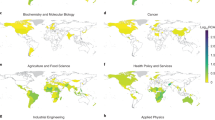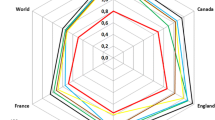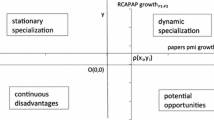Abstract
In this paper newly established characteristics of the so-called Matthew Effect for Countries (MEC) are presented: field-dependency, time-stability, order of magnitude. We find that the MEC is observable in all main scientific fields that were investigated. Over fifteen years the MEC has been relatively stable. The MEC is a redistribution phenomenon at the macro-level of the sciences. Its magnitude is small; the MEC affects only about five percent of the world production of citations. The MEC, however, crucially impacts many nations when their “national loss of citations” amounts to a high percentage of their expected citations. The relationship between the MEC and Merton's Matthew Principle is discussed. It is our hypothesis that the MEC provides an additional approach for the assessment of the scientific performance of nations.
Similar content being viewed by others
References
M. Bonitz, E. Bruckner, A. Scharnhorst, Characteristics and impact of the Matthew effect for countries. In:Proceedings of the Sixth International Conference on Scientometrics and Informetrics, May 16–19, 1997, Jerusalem, Israel, pp. 23–33 The Hebrew University of Jerusalem, School of Library, Archive and Information Studies, Jerusalem, Israel, 1997.
R. K. Merton, The Matthew effect in science,Science, 159 (3810):56–63 (1968).
M. Bonitz, E. Bruckner, A. Scharnhorst, The Matthew effect or the two worlds in science. Consequences from world science structure research. In:Extended Abstracts of the Fourth Science and Technology Indicators Conference, October 5–7, 1995, Antwerp, Belgium, pp. 163–167. Centre for Science and Technology Studies, University of Leiden, Leiden, The Netherlands, 1995.
M. Bonitz, E. Bruckner, A. Scharnhorst, “Denn wer da hat, dem wird gegeben...”—Die Messung des Matthäuseffektes für Länder. In:Proceedings Deutscher Dokumentartag, September 24–26, 1996, Heidelberg, Germany, pp. 147–153. Deutsche Gesellschaft für Dokumentation, Frankfurt am Main, Germany, 1996.
M. Bonitz, E. Bruckner, A. Scharnhorst, Measuring the Matthew Effect for Countries. Paper at the conferenceSignatures of Knowledge Societies. Joint Meeting of EASST and 4S, October 10–13, 1996, Bielefeld, Germany.
M. Bonitz, E. Bruckner, A. Scharnhorst, Why and how could we measure the Matthew effect for countries? In:Proceedings COLIS 2, Second International Conference on Conceptions of Library and Information Science, October 13–16, 1996, Copenhagen, Denmark, pp. 185–199. The Royal School of Librarianship, Copenhagen, Denmark, 1996.
T. Braun, W. Glänzel, H. Grupp, The scientometric weight of 50 nations in 27 science areas, 1989–1993. Part I. All fields combined, mathematics, engineering, chemistry and physics,Scientometrics, 33 (1995) 263–293.
T. Braun, W. Glänzel, H. Grupp, Scientometric Indicators Datafiles. The scientometrics weight of 50 nations in 27 science areas, 1989–1993. Part II. Life sciences,Scientometrics, 34, (1995) 207–237.
M. Bonitz, E. Bruckner, A. Scharnhorst, Science strategy index,Scientometrics, 26 (1993) 37–50.
R. K. Merton, The Matthew Effect II.ISIS, 79 (1988) 606–623.
M. Bonitz, The scientific talents of nations or Science and the kingdom of heaven. Bibliometric Matthew effect for countries versus Biblical gospel parable of the entrusted talents,LIBRI, to be published.
T. Braun, A. Schubert, Dimensions of scientometric indicator datafiles: World science in 1990–1994,Scientometrics, 38 (1997) 155–204.
Author information
Authors and Affiliations
Additional information
Revised and extended version of a paper presented at the Sixth International Conference on Scientometrics and Informetrics, Jerusalem, Israel, June 16–19, 1997.
Rights and permissions
About this article
Cite this article
Bonitz, M., Bruckner, E. & Scharnhorst, A. Characteristics and impact of the matthew effect for countries. Scientometrics 40, 407–422 (1997). https://doi.org/10.1007/BF02459289
Received:
Issue Date:
DOI: https://doi.org/10.1007/BF02459289




